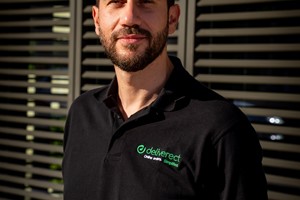The Singapore-based firm realized eight years ago the sector held the keys to sustainability and longevity. After $8 billion in investments, its agri-food division head is more bullish than ever.
When Temasek first decided to invest in the food and agriculture sector about eight years ago, it was looking for a venture fund that specialized in the space to contribute to, Agri-Food Investments Head Anuj Maheshwari said. But there weren’t any.
The state-owned investment company based in Singapore found a couple of smaller funds getting started, Maheshwari said, but they were also new to food and agriculture.
Temasek invests in industries and companies that are plugged into long-term trends shaping the world, Maheshwari said. We’re living in a technologically driven society, where digitization and new breakthroughs connect us all in new ways, he said. The way people consume goods and services is changing. People are living longer, therefore needs are changing. And there is a real need for the world to operate in a more sustainable way.
Investing in holistic change
As Temasek started looking at the food industry and who had the passion, the ideas and the know-how to make a difference, Maheshwari said it started making investments in a variety of companies.
The first was Ceva Santé Animale, a French company that can vaccinate chicken eggs against several different avian diseases, lessening the need for antibiotics. When animals used for food are treated with antibiotics, their residue can make those drugs less effective in people. Overuse of antibiotics can also lead to more resistant bacteria. Minimizing these threats, Maheshwari said, reduces a large problem in the current food system.
But Pat Brown, the founder of Impossible Foods — in which Temasek has invested three times since 2017 — attacked this strategy the first time he met Maheshwari. He recalled Brown told him companies that work in animal agriculture are destroying the world and should not be allowed to exist. Maheshwari said Temasek wants to change the world, but must continue to feed it, too.
“We allowed two alternates to a changing world and driving-faster world by investing in high-quality companies that were doing what? Adding proficiency to existing systems, and fundamentally re-questioning the system,” Maheshwari said. “So there’s Impossible Foods, which says, ‘Here’s a plant-based protein, and that’s just what people should have.’ That’s a great theory for them. But the practical reality is we still need to feed the people, and we still need companies that make chicken better.”
Temasek kept up its investment strategy, putting money into companies that improved the existing structure as well as those who looked beyond, using technology to create something new and better. Other than Impossible, many of the leading companies in the food tech sphere — including Perfect Day, Every Company, Next Gen Foods and Upside Foods — are in Temasek’s portfolio.
Investing in the future
While Temasek has supported some of the biggest names in food tech multiple times, it usually doesn’t jump into investing in a new upstart. Maheshwari said the firm is generally a Series B investor — Temasek comes in when a company has established itself and has some other long-term investors who can talk about its plans, progress and how it is fitting in to the marketplace.
After Temasek is convinced of a company’s potential and there is verifiable early success, it does not wait for the business to spend time perfecting its early offerings, plans or governance before investing, Maheshwari said.
“We’re willing to take the bet to put that second capital relatively early, so that what companies do is they really translate that early win into a real sort of acceleration of their business model and business plan,” Maheshwari said.
This strategy — and the financing — helped Impossible Foods in negotiations with Burger King to introduce the Impossible Whopper, he said. Through the years, Temasek has seen Impossible Foods continue to grow and develop, Maheshwari said, and the amount it has invested in them has gradually increased.
Maheshwari said that when Temasek invests, it also brings connections and expertise to the table. While it doesn’t know how to create the best alternative proteins, Maheshwari said Temasek is knowledgeable on the business space and can advise a company to help it grow and succeed. Some people connected with Temasek also serve on these companies’ boards of directors, sharing their knowledge of how to grow, scale and operate successfully.
As a large global investor, Temasek also has deep connections to many industries all over the world. Sometimes, smaller businesses aren’t interested in talking to bigger companies because they fear the giants may be after their intellectual property, Maheshwari said. Temasek has often served to build a bridge between these two entities and facilitate a conversation — which may lead to high-level partnerships or increased funding down the line.
Aside from its investments in food and agriculture tech companies, Temasek supports a research laboratory in Singapore. The Temasek Life Sciences Laboratory has 225 researchers who are studying plant and animal foods, fermentation, functional foods and other areas in food tech, and it is affiliated with the National University of Singapore.
Temasek has also created the Asia Sustainable Foods Program, which helps connect promising startups to the tech, equipment, and know-how they need in the region. Maheshwari said these kinds of programs help to bring together all sides of the food tech industries — manufacturers, scientists, regulators, policymakers and consumers — to influence the conversation and help the ecosystem.
When Temasek first got started investing in food and agriculture, it was just about the only big venture fund there. In 2021, the agriculture and food tech sector received $51.7 billion in investments, according to AgFunder’s annual report. Maheshwari said he is glad to see more money coming into the space, though he worries that some investors may be putting their funds toward food tech because it’s a hot space and skipping the due diligence needed. Maheshwari advised any large investor looking to this area to ask the hard questions and make sure that a company has what it takes to be successful.
However, Maheshwari expects this segment to generate even more investor interest, and the high dollar figures from 2021 are unlikely to be an anomaly. People worldwide — ranging from entrepreneurs to investors to manufacturers — are beginning to see how important a transition of the food system is to create a more sustainable world. And, he said, those investors may be tired of putting their money into things like vehicle batteries.
While the stock market has been somewhat unpredictable as of late, Maheshwari also hopes that some of the companies Temasek has been supporting decide to go public, allowing any investor to enjoy the same returns the firm has seen. With more investment and greater scale, he said, food tech can make what we eat even more cost effective than products on the market today.
“I am bullish,” Maheshwari said. “I just think that the need is there, and good ideas are there, and when we look at our portfolio, we are seeing some outstanding companies which are proving [the] economics [of food tech] coming up.”














